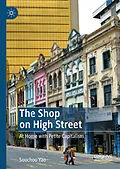Autorentext
Souchou Yao is a writer and critic based in Sydney, Australia, and Kuala Lumpur, Malaysia. He is a former Senior Lecturer in Anthropology at the University of Sydney. His major works include Confucian Capitalism: Discourse, practice and the myth of Chinese enterprise (2002), Singapore: The state and the culture of excess (2007), and The Malayan Emergency: Essays on a small, distant war (2016).
Inhalt
Chapter Summaries
Chapter 1: Introduction: Petite Capitalism what drives it?
The Chinese immigrants brought their traditional art of healing with them to British Malaya. The author's grandfather set up an herbal medicine business in Ipoh, then his son opened a shop in Kuala Lumpur. The Chinese medicine trade was typically owner-operating, and relying on family labour. As a petite capitalist enterprise, the small family business suffered from systematic problems of the economic form. It is small in capital, it is small in operations and turnovers, and a social shame is cast on the owner for his meagre wealth and social reputation. The social shame as the petite, the 'littleness', of petite bourgeoisie or petite capitalists suggests afflicts on the shopkeepers and shapes their ambitions. For some, however, the sense of 'littleness' becomes a drive, an anxious endeavour to improve his circumstances. The ethnography of the High Street shop traces the impact of such a contradiction: the almost feverish efforts of the family to create a better life for itself, and the real and imaginary social judgement of its poor status and community standing.
The way of social and economic improvement is complex, with detours of disappointments and emotional pain. Alienation of the young as well as the fantasies and overreaching of the adults too are a part of the story of the Chinese diaspora. At the High Street shop, the concept of petite capitalism proves it usefulness. It shows the inner life of a Chinese family and its economic existence, and it puts sham to the 'rag to riches' narrative made much of by the Chinese diaspora themselves.
Chapter 2: The Shop on High Street
The colonial shophouse is petite capitalism in architectural form. The merging of the place of work and the place of residence in a single space is rich in effects and cultural implications. Devotion to work is also devotion to the family; commitment to the family must ipso facto a commitment to work there's no greater virtue in the Chinese petite bourgeoise ideal. In a philosopher's tour of the shophouse, Bachelard's reading of the colonial shophouse reveals a spatial organization that exudes family harmony, the joyful necessity of work, ethical behaviours consistent with the values of a family striving for economic betterment.
The chapter is an ethnography of the shophouse, it is also an ethnography of work as virtue. Family and personal virtue is significant not only because it aids production; but because it fosters harmony and makes family life fulfilling. During a 'tiger balm' evening, the family got together in the domestic manufacturing of a home product, with the aim to take a slice of the market of the famous brand. The 'tiger balm' evening was something of nostalgia for the author. It shows the double-face of the Chinse shophouse, where oppressive work demands and family love co-existed together in a single place.
Chapter 3: Making Money with Friends and Kin
The foundation of Chinese petite capitalism is its social character. Relationships spin out from the shophouse to the neighbourhood and beyond, from its owner to a web of connectedness that was, as the legend goes, good for business. And yet the Chinese family business takes on a social and cultural form, and the economic take of things may be falsifying. One cannot expect the Chinese petite capitalist to read Montaigne and Aristotle. For Montaigne's friendship of 'two hearts in one' , and Aristotle's concept of friendship of virtue, both decry the moral vulgarity of social relationship's usefulness. The problem lies in the Chinese diaspora's near obsession with guanxi connections: the art of making money with friends and kin.
For the Chinese shopkeeper, doing business the guanxi way confirms to a traditional precept. It gives satisfaction by transacting with people you already know; it is social and cultural appropriate. In the process a cultural legitimacy is glossed over the act of profit taking. Among the Hakka herb dealers in Malaysia, guanxi dealings are full of the cultural ideal that self-interest and mutual considerations are in perfect accord.
This reliance on guanxi is enhanced by the Hakka kinship. The anthropological debate sways between kinship as a social or a genealogical category. The Hakka kinship verges towards the social rather than blood connections. Among the Hakka shopkeepers in Malaysia, the practice was to include people as kin whose ancestors came from the...
